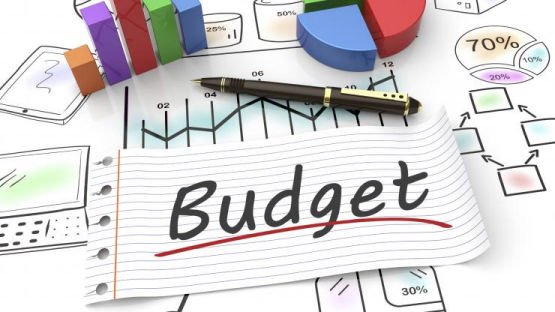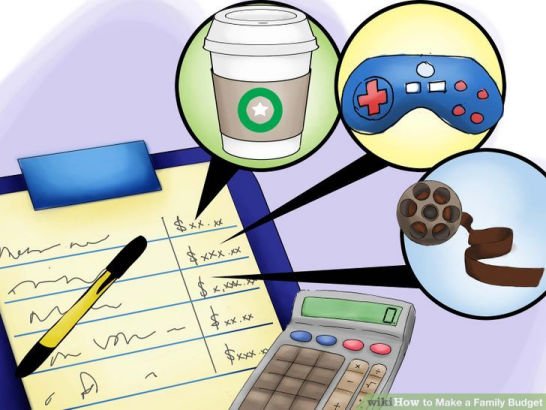Budgeting to Meet Your Needs Doesn't Have to Be Painful

Budget either terrifies or comforts most people. In another life, I provided financial counselling to people who had experienced financial issues. It sure provided me with exposure to a wide range of people.
This post is inspired by @natalyaborq’s post yesterdayabout her interesting in trying out a budget. I was going to leave a comment and then decided to do a post instead.
The people I counselled had gone through either a bankruptcy or had made a proposal to their creditors to pay back a portion of their debt in order to restructure their debt load. As the process is meant to be rehabilitative and a chance to start over, financial counselling is part of the process.
Not everyone was receptive to trying the process. Most often I’d get, “I have no money to budget with”. I’d be then challenged to try to convince them, they need a budget more than anyone. I had varying success on that.
There were others, man, once they caught on to the idea that they can indeed live on cash and within their means. There was no stopping them. They loved the sense of freedom and control it gave them.
Before You Start
I’m writing this as though a single individual was doing the budgeting. If a couple is doing the budgeting, it’s important they have honest, non-judgemental discussions and reach common ground.
A clergy friend worked with me for a time. He once told me that in hind-sight, he realized that of the many many couples he had counselled over fourty years, the often unspoken source of their conflict was based on finances. He just hadn’t realized how important the subject was and while couples often mentioned them in passing, he never picked up on the signal and asked. They would talk about their sex lives, but were way more hesitant to talk about finances.
So, before you start building a budget, you need to first know why you need a budget. That sounds a bit counterintuitive, after all, you need to keep your bills paid, right? Yes, but is that your own financial goal?
Do you want to save for a vacation? Retirement? Your first home? Your dream home? A new car? An emergency fund? And the list goes on.
As all my clients had just experienced financial insolvency, and were getting a new start, I strongly suggested that they start with their first goal to establish an emergency fund of at least $2000. It would give them a bit of a cushion and be money that would only be used to look after true emergencies like car or home repairs, unexpected medical expenses etc. Deciding you absolutely needed to take a trip this weekend didn’t count.
Be Honest With Yourself
It’s important to be honest about your shopping habits and how important they are to you. You can’t change what you wont acknowledge.
I sat with a client once who had just filed a proposal to their creditors. Her and her husband had good jobs and while they had had some setbacks which had led to their situation, I knew something hadn’t been brought into the light. I just hadn’t been able to identify the issue.
When I was doing the first counselling session, the wife dropped a remark that she thought they were going to have to sell their house. I was puzzled, we had just submitted a budget that allowed them to keep up with their house payments and meet their other expenses.
I brought out the budget we had created and asked if anything had changed on their fixed expenses. They said no. So, okay, let’s explore the other expenses. I took out a calculator, entered their income, subtracted their fixed expenses and then asked them to give me their estimates of their other expenses. I subtracted each amount without comment. Finally, they fell silent.
I prompted them to see if there was anything they missed. No, that is all they told me. I turned the calculator around and informed them, that I could live very comfortably on the amount that was left on the calculator, $2,000.
There was a silence for a few minutes and the wife then started telling me that she’d been to a discount store the night before to get some rice. I waited, she didn’t elaborate so I asked why that was a problem? With a sheepish look toward her husband, she went on to tell me that the small purchase of rice had blossomed to $140 through her buying ‘specials’.
We had a discussion about how to thwart impulse buying. The previously unacknowledged destructive behaviour had been acknowledged.
Getting Started
There are two areas you need to become very familiar with in order to establish a budget. That is knowing your income and your expenses. You’d be amazed how many people pay very little attention to both.
Income
If you are employed, you have a pretty good sense of how much you are going to make. You need to sort out first your monthly income and then can break it down from there as needed to establish your budget.
If you get paid every two weeks, don’t just double the amount of your pay cheque and consider that to be your monthly income. There are months you will have three pays, not two. Divide your pay by two and multiply by 4.33 to get your monthly income. If you get paid weekly, also multiply by 4.33 to get your monthly.
If you are self-employed, it can be challenging to establish an income base. You may need to take a look at last year’s income by month and analyze what you believe is the amount you can count on earning each month to use as an income base.
Expenses

Source
This is the area that will need the most work, but will decide your success with budgeting. Your expenses. Most of us know the regular expenses which go out, the rent or house payment, property taxes, car payments, credit cards etc. Although, the goal here is to eliminate the credit card dependency. If you have credit card debt, you need to pay attention to it.
I usually suggested to my clients to take a month and to carefully, and honestly, record EVERY single expense. That included buying a cup of coffee or newspaper. No expense was too small to record. How they recorded them was up to them, but they needed to be consistent.
This exercise separated the ones who were going to move forward from those who were going to default to their old ways really quickly. Yes, it takes work, but it pays off in many ways. Everyone of my clients who did this reported a heightened awareness of expenses they never noticed going out the door before.
One client was astounded to learn she had spent $500 a month and wasn’t sure on what. She decided to be far more detailed the next month. Rather than record each transaction, she thought she’d get organized and put them into categories. Her ‘other’ racked up the unknown amount. Sure enough, it was those small, insignificant amounts that racked up the $500 when she recorded every transaction. Time consuming, but it can be an eye opener.
Pulling It Together
So, now you know your income and you have this long list of expense transactions, now what?
The first thing you want to do is sort out those transactions into topics which meet your needs. The most basic place to start is:
- Food — food you bring home to prepare
- Shelter — includes your housing costs like mortgage, rent, electricity, water, phone, cable, Internet
- Transportation — public transit, car expenses etc.
- Personal Needs — includes clothing, haircuts, dry cleaning, medications, life insurance, medical insurance etc.
- Other — use it for now, so you don’t bog yourself down if something doesn’t fit elsewhere.
Once you get the list of transactions sorted into topics, then you need to review each topic.
Non-Discretionary Expenses
The first thing you need to identify is which expenses are required every month and you really can’t change the amount? Items like rent, car payments, mortgage etc will be included in this. These are non-discretionary expenses and must be paid each month.
If you pay support or regular medical expenses, those are included as well. These have a priority each month as they have to be paid.
Discretionary Expenses
These are expenses you have to make but you may be able to vary the amount you spend. Groceries are one item. You need to buy groceries but could you buy smarter than you are currently?
Are you driving to work when you could actually walk? You can save on car expenses if that is the case.
I Just Have to Have Expenses
These are expenses you decide you could do without but choose not to. Be deliberate, if you decide life isn’t worth living without that particular expense, set a budget item for it.
Making It Work
To make budgeting work, it needs to be sane, sensible and doable. If you set yourself a budget that you just can’t live by, you’ll set yourself up to fail. Don’t be afraid to change and adjust month to month as you need to. Just commit to trying the budget for a month and keep track of what doesn’t work and how you could adjust it the next month .
The Envelop System
@natalyaborq’s post yesterday did a great job of describing what I refer to as the envelop system.
It really doesn’t matter if you use an envelop, jars or an app on your phone. What matters is you make the plan, work the plan and be faithful to your goals.

I do like any posts that talk about personal finance!
I'm definitely going to read this :) thank you !
Basic advice. It's amazing how so many people don't know these things though. Dave Ramsey advocates the same thing. Know where the money goes so you can decide in advance where the money should go instead, and exercise self-discipline to follow the plan.
The hardest part about budgeting is when debt has been built up though. The prospect of paying off tens or hundreds of thousands of dollars is the most daunting prospect. Focusing on one bill at a time, and starting with the smallest, does allow a sense of achievement as they are paid off, and the saved money can be snowballed into bigger payments until they are all gone.
yes, absolutely, I considered mentioning the snowball method of paying off debt and decided to focus on budgeting in this post. But, building in funds to pay down and eliminate debt is important though.
As part of the making it work part of the advice given above there are some great apps to keep track of your day to day expenses.
They can help you control what your spending. I think its very easy today to just tap your card and you have no idea what your spending.
Not only do these apps keep track of your spending but using apps which give push notifications to your phone when you spend something is an effective gentle reminder.
In the UK there is an app called Revolut. You can top it up with money and you get a debit card which keeps track of your spending in a very user friendly easy to use app interface. (Its all free too)
There are other apps too depending on your country, I also know of one in Germany N26. (Its all free too)
In Ireland, where I am from, some of the local banks have really good apps which let you track your spending but the best I have seen is Revolut (which also works here)
You are very correct, there are apps that are effective in helping you track spending. I have found that having clients manually record each transaction in either a notebook or a list in a note app was far more effective to give them that jumpstart of being mindful of what they were spending.
Once the budget was setup, using an app to track spending and to help them stay within the budget helped them stay on track.
Apps are great, but they often distract which is counter productive when trying to find areas to reduce or improve spending.
Great info. Maybe just me but budgeting always seems painful lol. upvoted resteemed
it takes your attention and being deliberate but most people who take it on and do it.. find it liberating when they do a sane, sensible and doable budget.
great post, have to resteem this text full of useful advise @shadowspub
thank you @uwelang, that is very kind of you